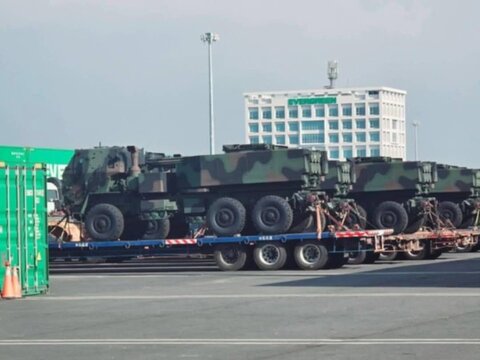Eric Gomez
The US arms sale backlog to Taiwan was reduced by $436 million in November 2024 as the first tranche of 11 High Mobility Artillery Rocket Systems (HIMARS) arrived. With this delivery, the arms sale backlog is now valued at $21.95 billion. See Figures 1 and 2 for a breakdown of the backlog by weapon category and a side-by-side comparison with October 2024, respectively.
Donald Trump’s victory in the US presidential election will also have important consequences for US arms sales to Taiwan.
The first Trump administration is responsible for the bulk of the Taiwan arms backlog by dollar value. Of the $21.95 billion in undelivered weapons, the Trump administration sold $15.70 billion, roughly 72 percent. This will change over the first two years of the second Trump administration as several large sales are scheduled to be fully delivered by the end of 2026. But it is worth comparing the Trump and Biden administrations’ records on arms sales to Taiwan in detail.
HIMARS Delivery and New Maintenance Sales
In early November, Taiwan’s Ministry of National Defense confirmed the delivery of a batch of HIMARS launchers and Army Tactical Missile Systems. The HIMARS is a mobile, precise rocket artillery system that has seen heavy use in Ukraine. In our dataset, it is coded as an asymmetric capability due to its relatively low unit cost and high mobility, which makes it harder to find and destroy.
The November delivery fulfills a $436 million foreign military sales (FMS) case that was notified to Congress in October 2020, an almost four-year gap between notification and final delivery. Earlier press reporting suggested delivery of this sale would be completed sometime in 2025, so this first batch of HIMARS may have arrived a little ahead of schedule.
Taiwan is still waiting on delivery of a second batch of 18 HIMARS launchers and munitions valued at $520 million, which were notified to Congress in December 2022. This second batch is scheduled to arrive in 2026. Taiwan ordered the additional HIMARS after canceling a $750 million FMS case for Paladin self-propelled howitzers.
The United States also announced two new FMS cases to maintain equipment already in Taiwan, $65 million to support a field communication system, and $320 million for F‑16 aircraft and radar spare parts. As discussed in previous updates, our dataset does not count maintenance FMS cases as part of the arms backlog because they support equipment that Taiwan could use to defend itself, unlike backlogged arms sales that Taiwan has not received yet.
For an itemized list of arms sales in the backlog, see Table 1.
Comparing Trump and Biden
The pending return of Trump to the White House has prompted much speculation over where the US–Taiwan relationship will go next. Including backlogged cases, delivered cases, and maintenance cases, the first Trump administration issued 22 Taiwan FMS notifications valued at $18.65 billion. The same figures for the Biden administration as of November 2024 are 27 notifications valued at $8.71 billion.
However, comparing only the topline figure for arms sales to Taiwan ignores important details.
Figure 3 compares the Trump and Biden administrations by category of weapons system. The two administrations sold roughly the same dollar amount of asymmetric capabilities, but the Trump administration sold Taiwan $10.4 billion in traditional weapons compared to the Biden administration’s $500 million.
Traditional weapons are more flexible but they tend to have much higher unit and lifetime costs and take longer to build than asymmetric capabilities. As of November 2024, only one of the four traditional FMS cases that the Trump administration notified to Congress had been delivered to Taiwan. Initial deliveries of Abrams tanks and F‑16s—both announced in 2019—should begin in the next few months and end sometime in 2026.
The Biden administration, by comparison, has placed greater emphasis on asymmetric capabilities (9 cases, $4.36 billion) and maintenance (14 cases, $2.81 billion). Given Taiwan’s relatively low level of defense spending, acquiring more asymmetric capabilities to fend off a Chinese invasion while maintaining existing traditional capabilities to respond to lower-intensity conflict and aggression is a sensible strategy. In other words, while the first Trump administration sold Taiwan more weapons, the Biden administration sold Taiwan a better mix of weapons for Taiwan’s self-defense needs.
Some recent news reports suggested that Taiwan might put forward a large arms sale wish list early in the second Trump administration to demonstrate its seriousness about self-defense and create political goodwill. The Financial Times gives a figure of $15 billion for surface warships, F‑35 fighter aircraft, E‑2D early warning aircraft, and Patriot interceptors.
This would be a terrible choice for Taiwan.
Except for Patriot interceptors, all the capabilities mentioned in the Financial Times are traditional systems that will eat up a large share of Taiwan’s limited defense budget, be relatively easy for China to counter, and take a long time to be built and delivered. While it has not been perfect, in the past few years Taiwan has increased its focus on acquiring new asymmetric capabilities that it urgently needs. The allure of the large arms sale is understandable. However, it makes much more sense for Taiwan and American interests for Taipei to continue buying cheaper but more militarily effective asymmetric capabilities.
Taiwan Arms Backlog Dataset, November 2024


























